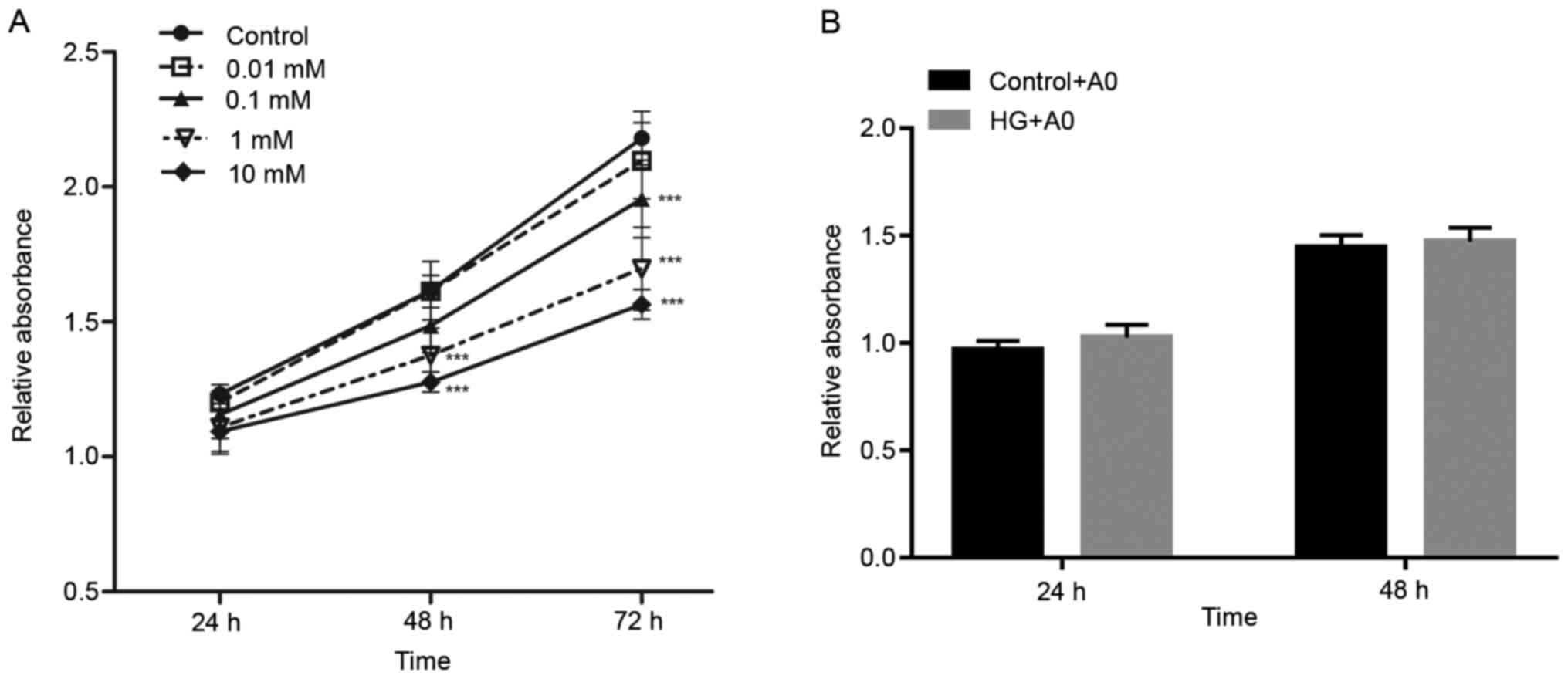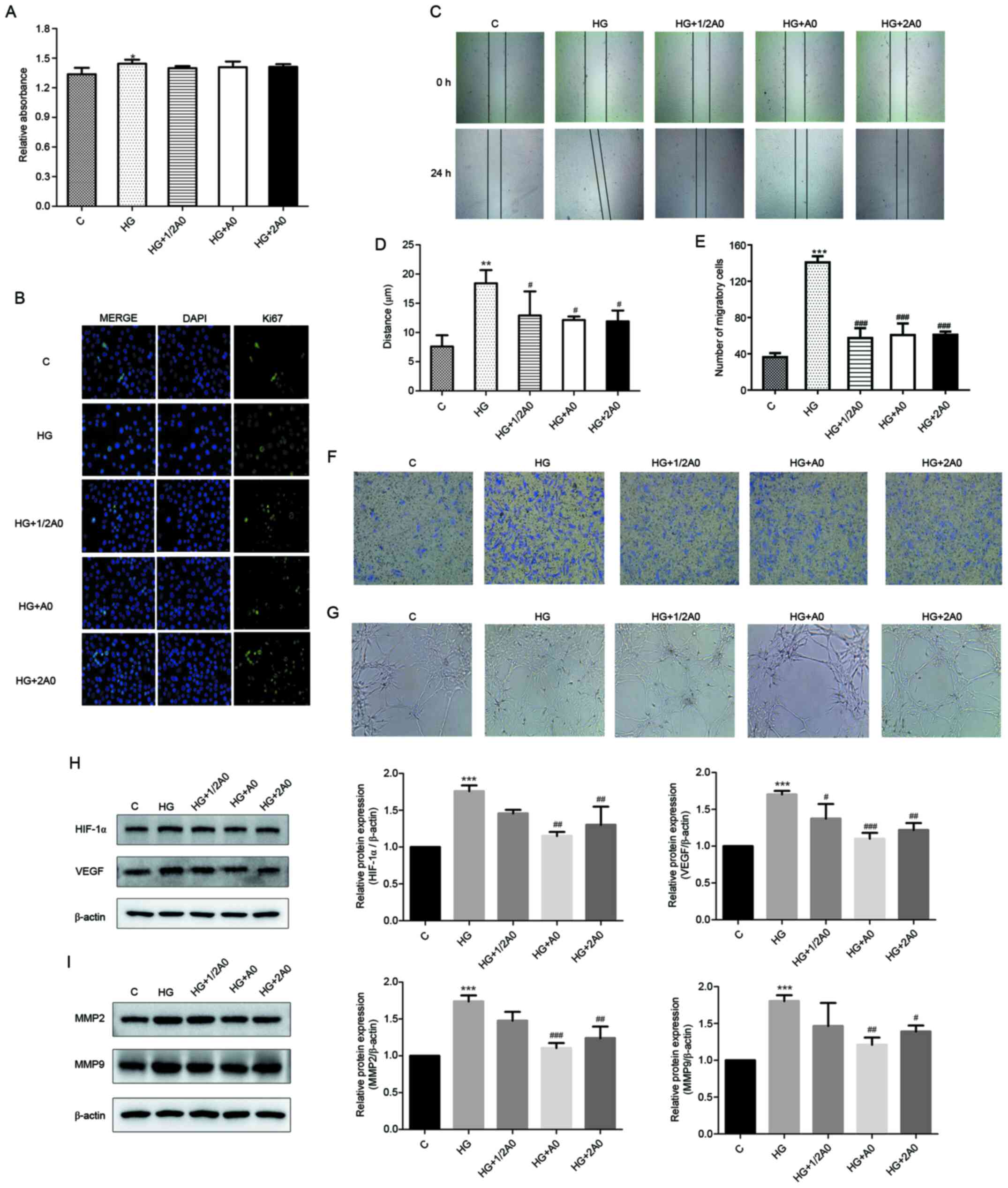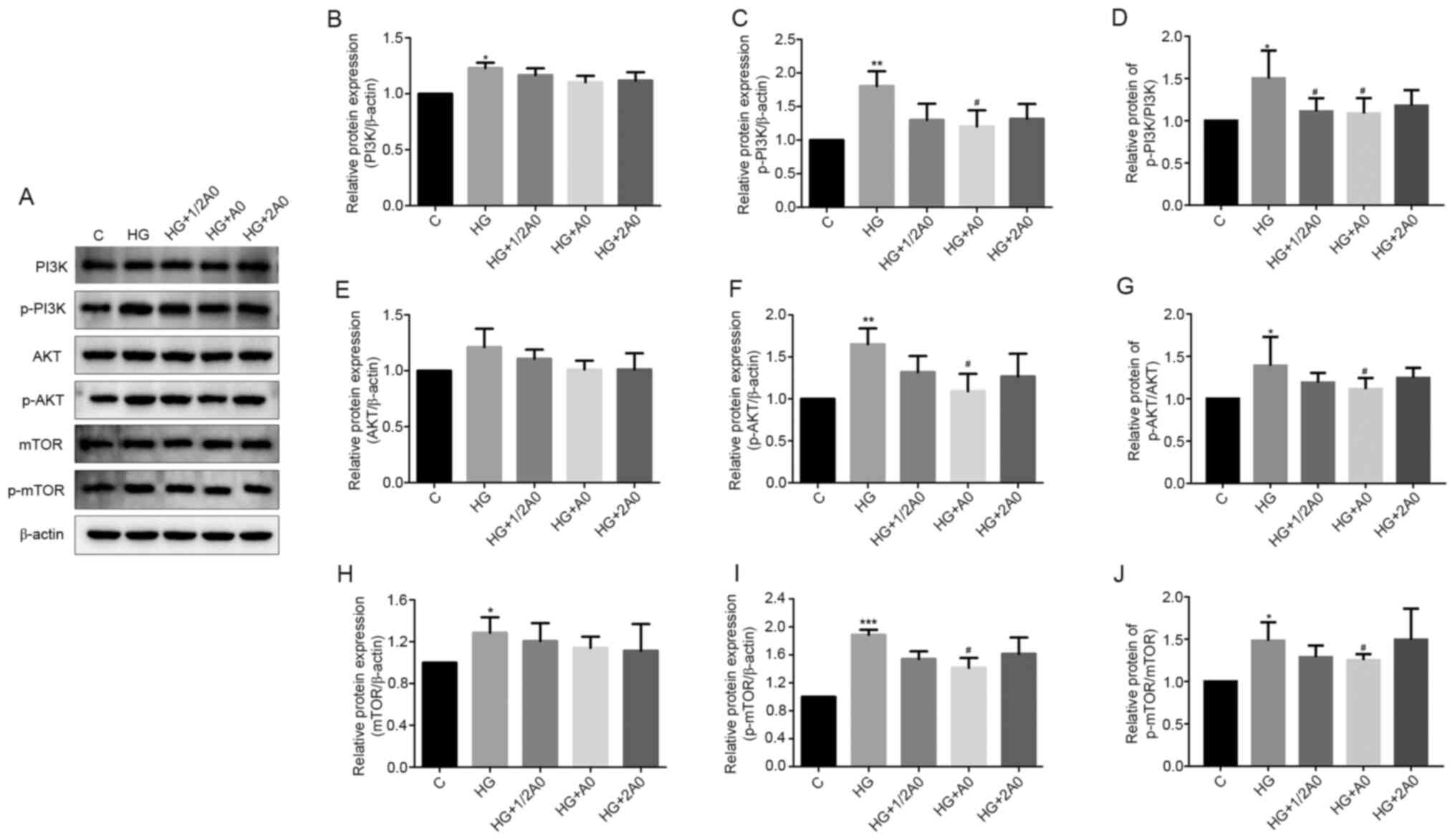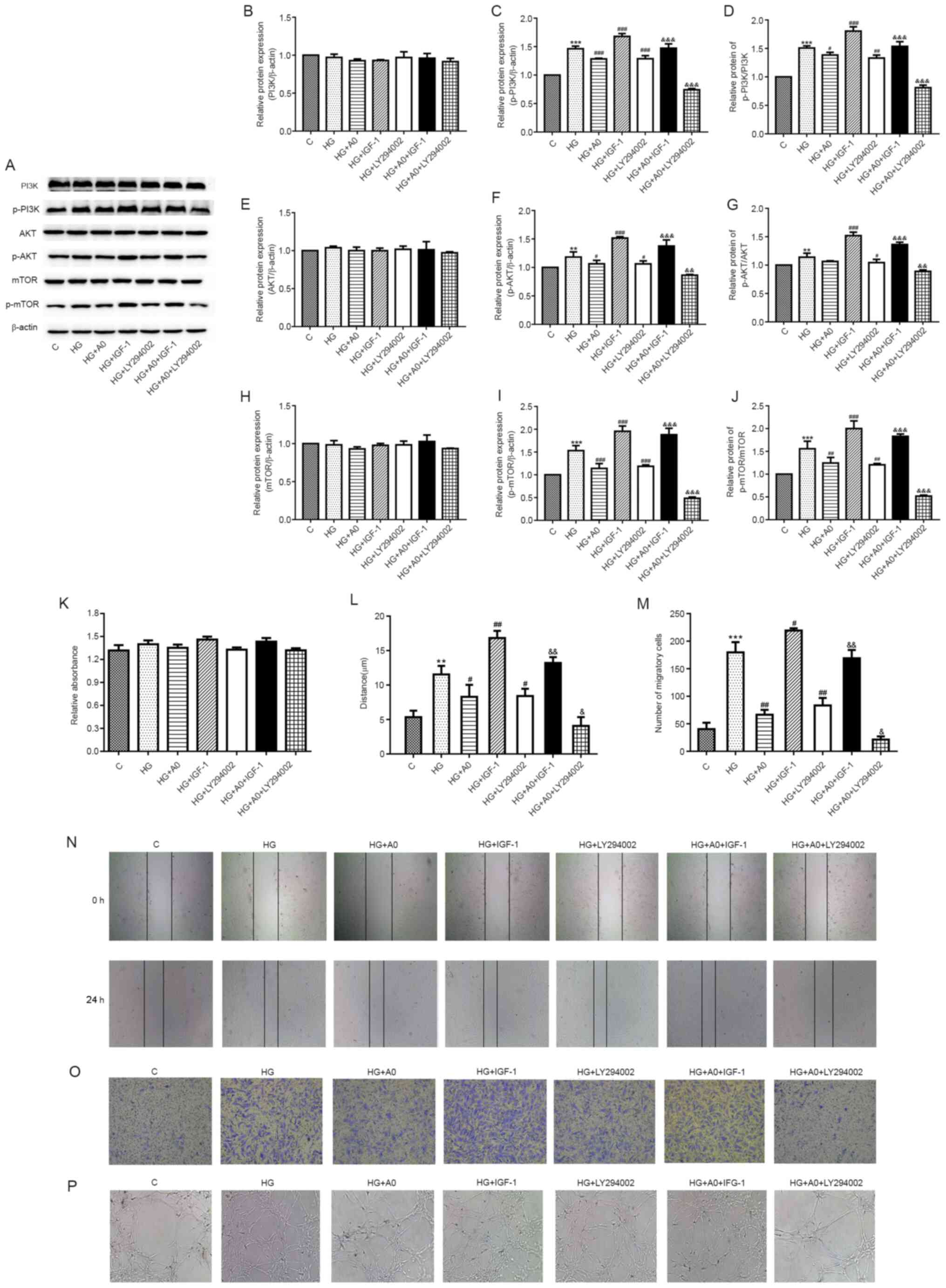|
1
|
Cheung N, Mitchell P and Wong TY: Diabetic
retinopathy. Lancet. 376:124–136. 2010. View Article : Google Scholar : PubMed/NCBI
|
|
2
|
Ting DS, Cheung GC and Wong TY: Diabetic
retinopathy: global prevalence, major risk factors, screening
practices and public health challenges: a review. Clin Exp
Ophthalmol. 44:260–277. 2016. View Article : Google Scholar : PubMed/NCBI
|
|
3
|
Wang W and Lo AC: Diabetic retinopathy:
Pathophysiology and treatments. Int J Mol Sci. 19:18162018.
View Article : Google Scholar : PubMed/NCBI
|
|
4
|
Whitehead M, Wickremasinghe S, Osborne A,
Van Wijngaarden P and Martin KR: Diabetic retinopathy: A complex
pathophysiology requiring novel therapeutic strategies. Expert Opin
Biol Ther. 18:1257–1270. 2018. View Article : Google Scholar : PubMed/NCBI
|
|
5
|
Kim D, Lee D, Trackman PC and Roy S:
Effects of high glucose-induced lysyl oxidase propeptide on retinal
endothelial cell survival: Implications for diabetic retinopathy.
Am J Pathol. 189:1945–1952. 2019. View Article : Google Scholar : PubMed/NCBI
|
|
6
|
Mei X, Zhou L, Zhang T, Lu B, Sheng Y and
Ji L: Chlorogenic acid attenuates diabetic retinopathy by reducing
VEGF expression and inhibiting VEGF-mediated retinal
neoangiogenesis. Vascul Pharmacol. 101:29–37. 2018. View Article : Google Scholar : PubMed/NCBI
|
|
7
|
Imran M, Arshad MS, Butt MS, Kwon JH,
Arshad MU and Sultan MT: Mangiferin: A natural miracle bioactive
compound against lifestyle related disorders. Lipids Health Dis.
16:842017. View Article : Google Scholar : PubMed/NCBI
|
|
8
|
Ren K, Li H, Zhou HF, Liang Y, Tong M,
Chen L, Zheng XL and Zhao GJ: Mangiferin promotes macrophage
cholesterol efflux and protects against atherosclerosis by
augmenting the expression of ABCA1 and ABCG1. Aging (Albany NY).
11:10992–11009. 2019. View Article : Google Scholar : PubMed/NCBI
|
|
9
|
Núñez Selles AJ, Daglia M and Rastrelli L:
The potential role of mangiferin in cancer treatment through its
immunomodulatory, anti-angiogenic, apoptopic, and gene regulatory
effects. Biofactors. 42:475–491. 2016. View Article : Google Scholar
|
|
10
|
Ding LZ, Teng X, Zhang ZB, Zheng CJ and
Chen SH: Mangiferin inhibits apoptosis and oxidative stress via
BMP2/Smad-1 signaling in dexamethasone-induced MC3T3-E1 cells. Int
J Mol Med. 41:2517–2526. 2018.PubMed/NCBI
|
|
11
|
Deng Q, Tian YX and Liang J: Mangiferin
inhibits cell migration and invasion through Rac1/WAVE2 signalling
in breast cancer. Cytotechnology. 70:593–601. 2018. View Article : Google Scholar : PubMed/NCBI
|
|
12
|
Sellamuthu PS, Arulselvan P, Fakurazi S
and Kandasamy M: Beneficial effects of mangiferin isolated from
Salacia chinensis on biochemical and hematological
parameters in rats with streptozotocin-induced diabetes. Pak J
Pharm Sci. 27:161–167. 2014.PubMed/NCBI
|
|
13
|
Zhang Q, Kong X, Yuan H, Guan H, Li Y and
Niu Y: Mangiferin improved palmitate-induced-insulin resistance by
promoting free fatty acid metabolism in HepG2 and C2C12 cells via
PPARα: mangiferin improved insulin resistance. J Diabetes Res.
2019:20526752019. View Article : Google Scholar : PubMed/NCBI
|
|
14
|
Karar J and Maity A: PI3K/AKT/mTOR pathway
in angiogenesis. Front Mol Neurosci. 4:512011. View Article : Google Scholar : PubMed/NCBI
|
|
15
|
Huang W, Ding X, Ye H, Wang J, Shao J and
Huang T: Hypoxia enhances the migration and invasion of human
glioblastoma U87 cells through PI3K/Akt/mTOR/HIF-1α pathway.
Neuroreport. 29:1578–1585. 2018. View Article : Google Scholar : PubMed/NCBI
|
|
16
|
Nyengaard JR, Ido Y, Kilo C and Williamson
JR: Interactions between hyperglycemia and hypoxia: Implications
for diabetic retinopathy. Diabetes. 53:2931–2938. 2004. View Article : Google Scholar : PubMed/NCBI
|
|
17
|
Du S, Liu H, Lei T, Xie X, Wang H, He X,
Tong R and Wang Y: Mangiferin: An effective therapeutic agent
against several disorders (Review). Mol Med Rep. 18:4775–4786.
2018.PubMed/NCBI
|
|
18
|
Saleh S, El-Maraghy N, Reda E and Barakat
W: Modulation of diabetes and dyslipidemia in diabetic
insulin-resistant rats by mangiferin: Role of adiponectin and
TNF-α. An Acad Bras Cienc. 86:1935–1948. 2014. View Article : Google Scholar : PubMed/NCBI
|
|
19
|
Zhou L, Pan Y, Chonan R, Batey R, Rong X,
Yamahara J, Wang J and Li Y: Mitigation of insulin resistance by
mangiferin in a rat model of fructose-induced metabolic syndrome is
associated with modulation of CD36 redistribution in the skeletal
muscle. J Pharmacol Exp Ther. 356:74–84. 2016. View Article : Google Scholar : PubMed/NCBI
|
|
20
|
Miura T, Ichiki H, Hashimoto I, Iwamoto N,
Kato M, Kubo M, Ishihara E, Komatsu Y, Okada M, Ishida T, et al:
Antidiabetic activity of a xanthone compound, mangiferin.
Phytomedicine. 8:85–87. 2001. View Article : Google Scholar : PubMed/NCBI
|
|
21
|
Sha H, Zeng H, Zhao J and Jin H:
Mangiferin ameliorates gestational diabetes mellitus-induced
placental oxidative stress, inflammation and endoplasmic reticulum
stress and improves fetal outcomes in mice. Eur J Pharmacol.
859:1725222019. View Article : Google Scholar : PubMed/NCBI
|
|
22
|
Daud NH, Aung CS, Hewavitharana AK,
Wilkinson AS, Pierson JT, Roberts-Thomson SJ, Shaw PN, Monteith GR,
Gidley MJ and Parat MO: Mango extracts and the mango component
mangiferin promote endothelial cell migration. J Agric Food Chem.
58:5181–5186. 2010. View Article : Google Scholar : PubMed/NCBI
|
|
23
|
Xiao J, Liu L, Zhong Z, Xiao C and Zhang
J: Mangiferin regulates proliferation and apoptosis in glioma cells
by induction of microRNA-15b and inhibition of MMP-9 expression.
Oncol Rep. 33:2815–2820. 2015. View Article : Google Scholar : PubMed/NCBI
|
|
24
|
Li H, Huang J, Yang B, Xiang T, Yin X,
Peng W, Cheng W, Wan J, Luo F, Li H, et al: Mangiferin exerts
antitumor activity in breast cancer cells by regulating matrix
metalloproteinases, epithelial to mesenchymal transition, and
β-catenin signaling pathway. Toxicol Appl Pharmacol. 272:180–190.
2013. View Article : Google Scholar : PubMed/NCBI
|
|
25
|
Jia L, Sun P, Gao H, Shen J, Gao Y, Meng
C, Fu S, Yao H and Zhang G: Mangiferin attenuates bleomycin-induced
pulmonary fibrosis in mice through inhibiting TLR4/p65 and
TGF-β1/Smad2/3 pathway. J Pharm Pharmacol. 71:1017–1028. 2019.
View Article : Google Scholar : PubMed/NCBI
|
|
26
|
Wang N, Zhang C, Tan H, et al: Insulin
accelerates progression of diabetic retinopathy through activating
HIF-1α/VEGF pathway in retinal endothelial. cells. 2019.
|
|
27
|
Gao X, Li Y, Wang H, Li C and Ding J:
Inhibition of HIF-1α decreases expression of pro-inflammatory IL-6
and TNF-α in diabetic retinopathy. Acta Ophthalmol. 95:e746–e750.
2017. View Article : Google Scholar : PubMed/NCBI
|
|
28
|
Zhang D, Lv FL and Wang GH: Effects of
HIF-1α on diabetic retinopathy angiogenesis and VEGF expression.
Eur Rev Med Pharmacol Sci. 22:5071–5076. 2018.PubMed/NCBI
|
|
29
|
Aiello LP, Avery RL, Arrigg PG, Keyt BA,
Jampel HD, Shah ST, Pasquale LR, Thieme H, Iwamoto MA, Park JE, et
al: Vascular endothelial growth factor in ocular fluid of patients
with diabetic retinopathy and other retinal disorders. N Engl J
Med. 331:1480–1487. 1994. View Article : Google Scholar : PubMed/NCBI
|
|
30
|
Osaadon P, Fagan XJ, Lifshitz T and Levy
J: A review of anti-VEGF agents for proliferative diabetic
retinopathy. Eye (Lond). 28:510–520. 2014. View Article : Google Scholar : PubMed/NCBI
|
|
31
|
Cui J, Gong R, Hu S, Cai L and Chen L:
Gambogic acid ameliorates diabetes-induced proliferative
retinopathy through inhibition of the HIF-1α/VEGF expression via
targeting PI3K/AKT pathway. Life Sci. 192:293–303. 2018. View Article : Google Scholar : PubMed/NCBI
|
|
32
|
Yang X, Cao J, Du Y, Gong Q, Cheng Y and
Su G: Angiopoietin-like protein 4 (ANGPTL4) induces retinal pigment
epithelial barrier breakdown by activating signal transducer and
activator of transcription 3 (STAT3): Evidence from ARPE-19 cells
under hypoxic condition and diabetic rats. Med Sci Monit.
25:6742–6754. 2019. View Article : Google Scholar : PubMed/NCBI
|
|
33
|
Wei J, Jiang H, Gao H and Wang G: Blocking
mammalian target of rapamycin (mTOR) attenuates HIF-1α pathways
engaged-vascular endothelial growth factor (VEGF) in diabetic
retinopathy. Cell Physiol Biochem. 40:1570–1577. 2016. View Article : Google Scholar : PubMed/NCBI
|
|
34
|
Sasore T and Kennedy B: Deciphering
combinations of PI3K/AKT/mTOR pathway drugs augmenting
anti-angiogenic efficacy in vivo. PLoS One. 9:e1052802014.
View Article : Google Scholar : PubMed/NCBI
|
|
35
|
Yu Z, Zhang T, Gong C, Sheng Y, Lu B, Zhou
L, Ji L and Wang Z: Erianin inhibits high glucose-induced retinal
angiogenesis via blocking ERK1/2-regulated HIF-1α-VEGF/VEGFR2
signaling pathway. Sci Rep. 6:343062016. View Article : Google Scholar : PubMed/NCBI
|
|
36
|
Zhang ZZ, Qin XH and Zhang J: MicroRNA-183
inhibition exerts suppressive effects on diabetic retinopathy by
inactivating BTG1-mediated PI3K/Akt/VEGF signaling pathway. Am J
Physiol Endocrinol Metab. 316:E1050–E1060. 2019. View Article : Google Scholar : PubMed/NCBI
|
|
37
|
Zhang Y, Wang L, Zhang Y, Wang M, Sun Q,
Xia F, Wang R and Liu L: Nogo-B Promotes angiogenesis in
proliferative diabetic retinopathy via VEGF/PI3K/Akt pathway in an
autocrine manner. Cell Physiol Biochem. 43:1742–1754. 2017.
View Article : Google Scholar : PubMed/NCBI
|
|
38
|
Zeng J, Zhao H and Chen B: DJ-1/PARK7
inhibits high glucose-induced oxidative stress to prevent retinal
pericyte apoptosis via the PI3K/AKT/mTOR signaling pathway. Exp Eye
Res. 189:1078302019. View Article : Google Scholar : PubMed/NCBI
|


















